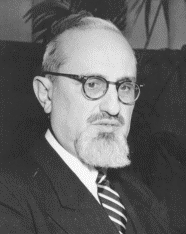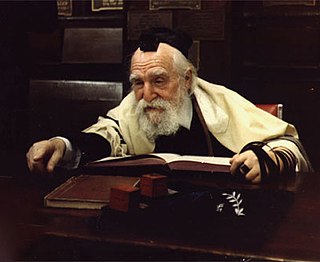
Abraham Joshua Heschel was a Polish-American rabbi and one of the leading Jewish theologians and Jewish philosophers of the 20th century. Heschel, a professor of Jewish mysticism at the Jewish Theological Seminary of America, authored a number of widely read books on Jewish philosophy and was a leader in the civil rights movement.

Conservative Judaism is a Jewish religious movement that regards the authority of Jewish law and tradition as emanating primarily from the assent of the people through the generations, more than from divine revelation. It therefore views Jewish law, or halakha, as both binding and subject to historical development. The conservative rabbinate employs modern historical-critical research, rather than only traditional methods and sources, and lends great weight to its constituency, when determining its stance on matters of practice. The movement considers its approach as the authentic and most appropriate continuation of halakhic discourse, maintaining both fealty to received forms and flexibility in their interpretation. It also eschews strict theological definitions, lacking a consensus in matters of faith and allowing great pluralism.
Halakha, also transliterated as halacha, halakhah, and halocho, is the collective body of Jewish religious laws that are derived from the Written and Oral Torah. Halakha is based on biblical commandments (mitzvot), subsequent Talmudic and rabbinic laws, and the customs and traditions which were compiled in the many books such as the Shulchan Aruch. Halakha is often translated as "Jewish law", although a more literal translation of it might be "the way to behave" or "the way of walking". The word is derived from the root which means "to behave". Halakha not only guides religious practices and beliefs, it also guides numerous aspects of day-to-day life.

The subject of homosexuality and Judaism dates back to the Torah. The book of Vayikra (Leviticus) is traditionally regarded as classifying sexual intercourse between males as a to'eivah that can be subject to capital punishment by the current Sanhedrin under halakha.

Louis Ginzberg was a Russian-born American rabbi and Talmudic scholar of Lithuanian-Jewish descent, contributing editor to numerous articles of The Jewish Encyclopedia (1906), and leading figure in the Conservative movement of Judaism during the early 20th century. He was born in Kaunas, Vilna Governorate and died in New York City.
The Rabbinical Assembly (RA) is the international association of Conservative rabbis. The RA was founded in 1901 to shape the ideology, programs, and practices of the Conservative movement. It publishes prayerbooks and books of Jewish interest, and oversees the work of the Committee on Jewish Law and Standards for the Conservative movement. It organizes conferences and coordinates the Joint Placement Commission of the Conservative movement. Members of the RA serve as rabbis, educators, community workers and military and hospital chaplains around the world.

The role of women in Judaism is determined by the Hebrew Bible, the Oral Law, by custom, and by cultural factors. Although the Hebrew Bible and rabbinic literature mention various female role models, religious law treats women differently in various circumstances. According to a 2017 study by the Pew Research Center, women are slightly more likely to identify with Judaism. They account for 52% of the worldwide Jewish population.

The Jewish Theological Seminary (JTS) is a Conservative Jewish education organization in New York City, New York. It is one of the academic and spiritual centers of Conservative Judaism and a center for academic scholarship in Jewish studies. The Jewish Theological Seminary Library is one of the most significant collections of Judaica in the world.
Joel Roth is a prominent American rabbi in the Rabbinical Assembly, which is the rabbinical body of Conservative Judaism. He is a former member and chair of the assembly's Committee on Jewish Law and Standards (CJLS) which deals with questions of Jewish law and tradition, and serves as the Louis Finkelstein Professor of Talmud and Jewish Law at the Jewish Theological Seminary of America in New York City, where he formerly served as dean of the Rabbinical School. He is also Rosh Yeshiva of the Conservative Yeshiva in Jerusalem, Israel, an institution founded and maintained by the United Synagogue for Conservative Judaism and under the academic auspices of JTS. In 2006, Rabbi Roth took over as chair of the Hebrew Language department at JTS. Rabbi Roth is a well-known teacher of Hebrew grammar. He is a vociferous proponent of the existence of the "sheva merakhef".

Joseph Ber Soloveitchik was a major American Orthodox rabbi, Talmudist, and modern Jewish philosopher. He was a scion of the Lithuanian Jewish Soloveitchik rabbinic dynasty.
The Committee on Jewish Law and Standards is the central authority on halakha within Conservative Judaism; it is one of the most active and widely known committees on the Conservative movement's Rabbinical Assembly. Within the movement it is known as the CJLS. The current chairman of the CJLS is Rabbi Pamela Barmash.

Rabbinic authority in Judaism relates to the theological and communal authority attributed to rabbis and their pronouncements in matters of Jewish law. The extent of rabbinic authority differs by various Jewish groups and denominations throughout history.
The Union for Traditional Judaism, founded in 1984, is a traditional, Halakhic Jewish outreach and communal service organization. It initially called itself "The Union for Traditional Conservative Judaism" but dropped "Conservative" from its title when it broke with the Conservative movement. In 1985 Rabbi Ronald D. Price was tapped to lead the organization as executive director and later as Executive Vice President. He served in that capacity for 26 years until his retirement in 2011. He was succeeded by Rabbi David Bauman and then Rabbi Gerald Sussman who is currently (2018) the executive director. In 1988 after attempting to affect change within Conservative Judaism, the UTJ membership voted to drop the word 'Conservative' from its title. Following a two-year period of negotiations, the Rabbinic Fellowship of the UTJ absorbed a modern Orthodox rabbinic organization, the Fellowship of Traditional Orthodox Rabbis. The merged rabbinic body is known today as MORASHAH. Some of the UTJ leaders at various times called themselves Conservative, Modern Orthodox or trans-denominational. The UTJ's Institute of Traditional Judaism (ITJ) granted semikhah to a number of rabbis, though as of 2018 there are no current semikhah students. The UTJ's Panel of Halakhic Inquiry has published three volumes of responsa titled "Tomeikh kaHalakhah." The UTJ produced the educational curriculum "Taking the MTV Challenge—Media and Torah Values" designed to provide high-school students with tools to respond to the electronic media. The UTJ is often viewed as representing a denomination or inhabiting an ideological space between Conservative and Orthodox Judaism.
Although rare, there are instances within Jewish law that mandate a Jew to sacrifice their own life rather than violate a religious prohibition. One of these prohibitions is that no life should be taken, including one's own. Many more ritual prohibitions exist as well, which means that under limited circumstances a Jew has to self-sacrifice when the greater good calls for breaking a more minor dictate. This practice reflects the practical and perhaps malleable nature of Judaic law.

Moshe Feinstein was an American Orthodox rabbi, scholar, and posek. He has been called the most famous Orthodox Jewish legal authority of the twentieth century and his rulings are often referenced in contemporary rabbinic literature. Feinstein served as president of the Union of Orthodox Rabbis, Chairman of the Council of the Moetzes Gedolei HaTorah of the Agudath Israel of America, and head of Mesivtha Tifereth Jerusalem in New York.
Conservative Judaism views halakha as normative and binding. The Conservative movement applies Jewish law to the full range of Jewish beliefs and practices, including thrice-daily prayer, Shabbat and holidays, marital relations and family purity, conversion, dietary laws (kashrut), and Jewish medical ethics. Institutionally, the Conservative movement rules on Jewish law both through centralized decisions, primarily by the Rabbinical Assembly and its Committee on Jewish Law and Standards, and through congregational rabbis at the local level. Conservative authorities produced voluminous Responsa literature.
Kevod HaBeriyot (Hebrew: כבוד הבריות; literally in Hebrew: "honor [of/due to] the [God's] creations " also variously translated as "individual dignity", "individual honor", or "human dignity" is a concept of Halakha originating in the Talmud which permits exceptions to Rabbinic decrees under certain circumstances. This concept has been used in a number of contemporary Jewish religious-law decisions in Orthodox and Conservative Judaism.
Criticism of Conservative Judaism is widespread in the Orthodox Jewish community, although the movement also has its critics in Reform Judaism and in other streams of Judaism. While the Conservative movement professes fidelity to Jewish tradition, it considers Halakha to be a dynamic process that needs reinterpreting in modern times. The criticism by Orthodox Jews and traditionalists within the movement itself revolves around the following:
Daniel S. ("Danny") Nevins is an American rabbi and a leader in the Conservative Movement who is head of school at Golda Och Academy in West Orange, NJ On January 29, 2007, Rabbi Nevins was named the Dean of the Rabbinical School of the Jewish Theological Seminary of America, succeeding Rabbi William Lebeau. In 2021, it was announced that Rabbi Nevins would be stepping down as dean of the JTS Rabbinical School. He was previously the spiritual leader of Adat Shalom Synagogue in Farmington Hills, Michigan, where he served for 13 years in his first pulpit. He is an authority on Jewish Law who co-authored a responsum that was passed by the Conservative Movement's Committee on Jewish Law and Standards paving the way for the Conservative Movement to allow gay marriage and to ordain lesbian and gay rabbis.
Sexual orientation has been a pivotal issue for Conservative Judaism since the 1980s. A major Jewish denomination in the U.S., Conservative Judaism has wrestled with homosexuality and bisexuality as a matter of Jewish law and institutional policy. As with other branches of Judaism debating the acceptability of sexual orientations other than heterosexuality, Conservative Jews faced both long-standing, rabbinic prohibitions on homosexual conduct as well as increasing demands for change in the movement's policies toward gays, bisexuals, and lesbians. Previously, the Conservative movement had changed its policies toward women, for example, by allowing the ordination of women as rabbis in 1983. Similarly, the Conservative leadership has been asked to stop discriminating against gay, bisexual, and lesbian people. This goal has been partially completed with the approval of the ordination of gay, bisexual, and lesbian rabbis in 2006 and of same-sex marriage ceremonies under Jewish law in 2012; However, the Conservative decision did not call same-sex marriages kiddushin, the traditional Jewish legal term for marriage, because that act of consecration is nonegalitarian and gender-specific. In the traditional kiddushin ceremony, a pair of blessings is recited and the bridegroom gives his bride a ring, proclaiming that he is marrying his bride “according to the laws of Moses and Israel.”.









